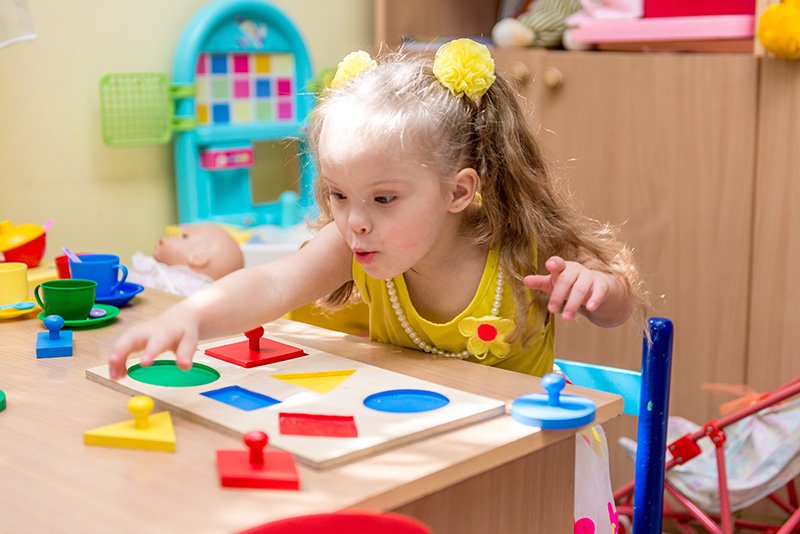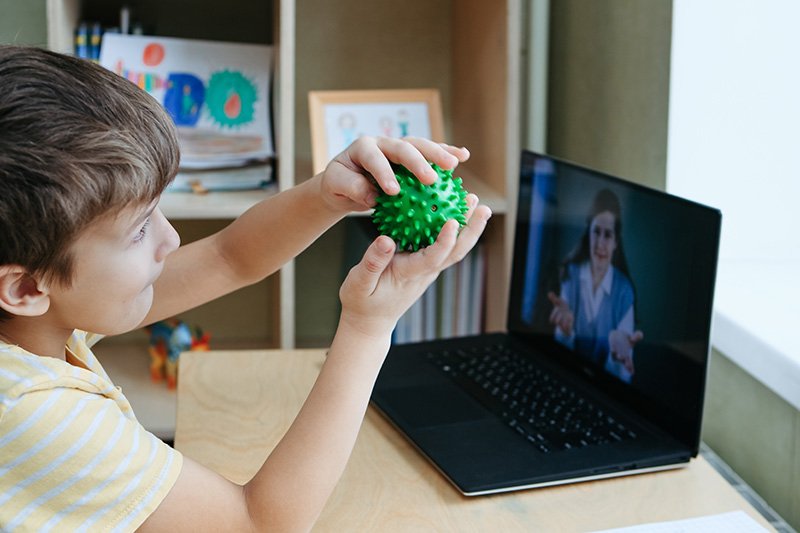
ABA Therapy at Home
Your insurance carrier will authorize a certain number of ABA therapy hours per week. After an intake assessment, your Wildflower BCBA will determine exactly how to allocate those hours to begin services. Don’t worry, if you aren’t sure how many hours you are allowed, the Wildflower team will check your benefits prior to intake.
We come to you! We do our absolute best to work with your family’s schedule and availability.
Home is where your child is most comfortable so it truly is where the most progress is made with major milestones such as potty training, talking, teeth brushing, and so much more.
Parent and caregiver training is so important and the home is an excellent environment for parents, caregivers, and family members to absorb the methods used in ABA session.
Who will be working with my child during in-home ABA sessions?
In-home aba therapy sessions are conducted by Behavior Technicians who are closely supervised by a Board Certified Behavior Analyst (BCBA). The BCBA supervising your child’s ABA therapy will be the very same BCBA who conducted your intake assessment and created your child’s unique treatment plan.
Will the supervising BCBA ever visit my home?
Yes! The supervising BCBA will not be in every session but they will work closely with your family, analyze data collected by your Behavior Technicians, and meet regularly with you to discuss any changes and updates in your child’s treatment plan.
For more answers to your questions, check out our Frequently Asked Questions.
Your insurance carrier will authorize a certain number of ABA therapy hours per week. After an intake assessment, your Wildflower BCBA will determine exactly how to allocate those hours to begin services. Don’t worry, if you aren’t sure how many hours you are allowed, the Wildflower team will check your benefits prior to intake.
We come to you! We do our absolute best to work with your family’s schedule and availability.
Home is where your child is most comfortable so it truly is where the most progress is made with major milestones such as potty training, talking, teeth brushing, and so much more.
Parent and caregiver training is so important and the home is an excellent environment for parents, caregivers, and family members to absorb the methods used in ABA session.
Who will be working with my child during in-home ABA sessions?
In-home aba therapy sessions are conducted by Behavior Technicians who are closely supervised by a Board Certified Behavior Analyst (BCBA). The BCBA supervising your child’s ABA therapy will be the very same BCBA who conducted your intake assessment and created your child’s unique treatment plan.
Will the supervising BCBA ever visit my home?
Yes! The supervising BCBA will not be in every session but they will work closely with your family, analyze data collected by your Behavior Technicians, and meet regularly with you to discuss any changes and updates in your child’s treatment plan.
For more answers to your questions, check out our Frequently Asked Questions.
Parent & Caregiver Training

ABA parent and caregiver training is the opportunity for those who care for your child to absorb the methods that are applied in-session by your Wildflower care team. The ultimate goal is to have successful application outside of sessions and in multiple environments.
Parent and caregiver training takes place everywhere and anywhere. Real-life scenarios such as a grocery store visit or a trip to the park are all learning opportunities.
Regularly scheduled meetings with the BCBA overseeing your child’s treatment plan are open door sessions for any questions or concerns you have. We maintain 100% transparency when it comes to the care of your child or loved one.
How can I ask questions regarding my child’s ABA therapy plan?
You will be given full access to secure communications via email, phone, and in-person meetings for any and all questions you have about your child or loved one’s treatment plan. Your inquiries will be answered as soon as possible and no later than 1 business day after your inquiry is sent.
Are there any tools I will be given to help retain the information on treatment methods?
You will be given tools such as parent guides and articles, definitions and examples of therapies used in your child’s specific treatment plan.
For more answers to your questions, check out our Frequently Asked Questions.
ABA parent and caregiver training is the opportunity for those who care for your child to absorb the methods that are applied in-session by your Wildflower care team. The ultimate goal is to have successful application outside of sessions and in multiple environments.
Parent and caregiver training takes place everywhere and anywhere. Real-life scenarios such as a grocery store visit or a trip to the park are all learning opportunities.
Regularly scheduled meetings with the BCBA overseeing your child’s treatment plan are open door sessions for any questions or concerns you have. We maintain 100% transparency when it comes to the care of your child or loved one.
How can I ask questions regarding my child’s ABA therapy plan?
You will be given full access to secure communications via email, phone, and in-person meetings for any and all questions you have about your child or loved one’s treatment plan. Your inquiries will be answered as soon as possible and no later than 1 business day after your inquiry is sent.
Are there any tools I will be given to help retain the information on treatment methods?
You will be given tools such as parent guides and articles, definitions and examples of therapies used in your child’s specific treatment plan.
For more answers to your questions, check out our Frequently Asked Questions.

ABA Teletherapy
Advancements in technology have given ABA a few tools we didn’t have before – one being Telehealth/teletherapy. There could be a number of reasons that an in-person session may not be possible and Telehealth sessions make sure your child and your family do not miss valuable session time.
Telehealth/teletherapy sessions are conducted via secure video conferencing platforms. Methods, stimuli, and what goals we work on will depend entirely on your child or loved one’s unique treatment plan.
Sessions can take place from anywhere in the world! This means your family can plan for outings and vacations and not miss out your ABA sessions.
Sessions that take place via video conferencing because your family is out of town or on a special outing are an opportunity for your Wildflower team to see how you and your child are faring in a new environment.
Are Telehealth hours a different service?
Telehealth is not defined as a separate service but as a delivery method used by providers and practitioners. If Telehealth is determined, by your Wildflower BCBA, to be an appropriate method of delivery, the time is part of the hours already approved by your insurance carrier.
For more answers to your questions, check out our Frequently Asked Questions.
Telehealth/teletherapy sessions are conducted via secure video conferencing platforms. Methods, stimuli, and what goals we work on will depend entirely on your child or loved one’s unique treatment plan.
Sessions can take place from anywhere in the world! This means your family can plan for outings and vacations and not miss out your ABA sessions.
Sessions that take place via video conferencing because your family is out of town or on a special outing are an opportunity for your Wildflower team to see how you and your child are faring in a new environment.
Are Telehealth hours a different service?
Telehealth is not defined as a separate service but as a delivery method used by providers and practitioners. If Telehealth is determined, by your Wildflower BCBA, to be an appropriate method of delivery, the time is part of the hours already approved by your insurance carrier.
For more answers to your questions, check out our Frequently Asked Questions.
ABA School Consultation
Accommodations for children with Autism and/or special needs is required of public schools. There are also some charter and private schools that opt into making these programs available. Wildflower Behavior Services consults with school districts to create and supervise the creation and implementation of these programs to ensure they are effective and meeting the needs of families throughout the Texas Hill Country region.

Wildflower Behavior Services can help schools improve existing systems or create new systems with the use of ABA-based methodologies. School districts may have limited resources to manage programs across all schools and Wildflower is here to help. Our approach is to evaluate and implement to increase positive behaviors, encourage student independence, and ensure inclusion.
Staff training to ensure methodology and delivery is according to best-practice. Common subjects and topics include behavior reduction, principles of ABA, teaching strategies, the importance of data, and so much more!
We work with all age groups and grades; from pre-K all the way through high school.
Assistance with Individualized Education Evaluations (IEE) which includes: Functional Behavior Assessments (FBA) and Behavior Intervention Plans (BIP).
Can Wildflower assist with case-specific intervention and training?
Yes. We can consult on specific cases and will provide the necessary authorization documentation to be able to do so.
Does Wildflower work with the individual students or with the special education teachers?
Both. Whether your school district is in need of qualified consultation for your staff or 1:1 time with your students, we are here to help.
For more answers to your questions, check out our Frequently Asked Questions.
Wildflower Behavior Services can help schools improve existing systems or create new systems with the use of ABA-based methodologies. School districts may have limited resources to manage programs across all schools and Wildflower is here to help. Our approach is to evaluate and implement to increase positive behaviors, encourage student independence, and ensure inclusion.
Staff training to ensure methodology and delivery is according to best-practice. Common subjects and topics include behavior reduction, principles of ABA, teaching strategies, the importance of data, and so much more!
We work with all age groups and grades; from pre-K all the way through high school.
Assistance with Individualized Education Evaluations (IEE) which includes: Functional Behavior Assessments (FBA) and Behavior Intervention Plans (BIP).
Can Wildflower assist with case-specific intervention and training?
Yes. We can consult on specific cases and will provide the necessary authorization documentation to be able to do so.
Does Wildflower work with the individual students or with the special education teachers?
Both. Whether your school district is in need of qualified consultation for your staff or 1:1 time with your students, we are here to help.
For more answers to your questions, check out our Frequently Asked Questions.
Ready to get started with ABA services?
Contact us to schedule a call to talk about your needs with a Wildflower BCBA.

